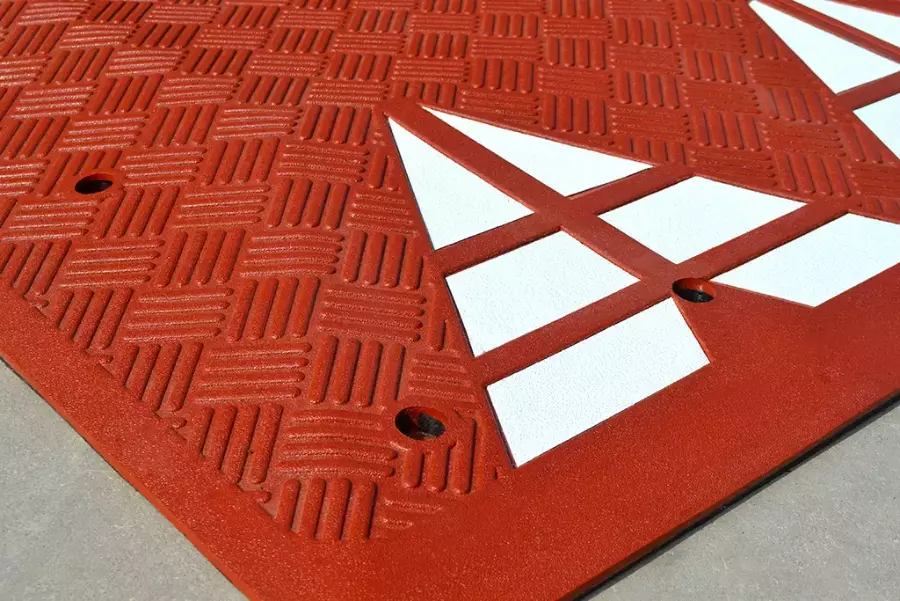
Speed Cushions
Speed cushions are raised surfaces installed across the width of a roadway, usually in the center of a traffic lane.
At Speed Cushion Factory, we manufacture a variety of speed cushions according to traffic safety regulations of different countries, such as the UK, Europe, and Belgium.
All our speed cushions are available in two sizes: 6.5 feet and 10 feet.
Moreover, our materials are environmentally friendly since we use 90% recycled rubber.
Our full range of speed cushions

Speed Cushions EUROPE
As the name indicates, these speed tables are created according to European standards.
Their triangular reflective tape makes them visible at night.

Speed Cushions Belgium
They are suitable for Belgium roadways, traffic lanes, city streets, roundabouts, intersections, and school zones.
They are constructed according to their rules and regulations.
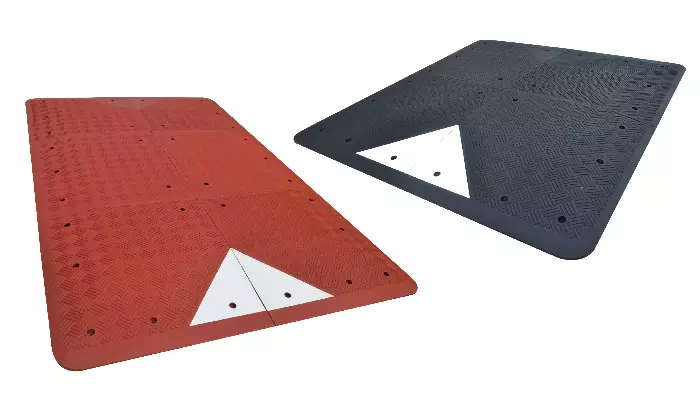
Speed Cushions UK
They have reflective tapes that enhance their visibility at night. They are also made of vulcanized rubber.
These speed cushions are created according to UK standards.
Different names and uses of speed cushions?
Speed cushions are raised surfaces installed across the width of a roadway, usually in the center of a traffic lane. These traffic safety and traffic calming tools are mainly designed to control traffic flow and prevent over-speeding.
Their width is more than the width of a car; hence drivers have to reduce their speed in order to drive over them comfortably. The longitudinal channels between speed cushions allow emergency vehicles like ambulances or fire tracks and other long-axle vehicles to drive over them without speed reduction.
Speed cushions are known by many different names, including:
- Speed lumps
- Speed tables
- Road cushions
No matter what name you use, all speed cushions serve the same purpose: to slow down traffic.
Want to get a free quote?
Feel free to contact us now!
Speed Cushion Factory
The Speed Cushions Factory is a leading manufacturer of rubber speed cushions located in Qingdao, China.
Qingdao, Shandong Province, China.
sales@speed-cushion.com
GET A FREE QUOTE
What are our main speed cushion dimensions?
Three designs
We manufacture speed cushions in 3 different designs.

Speed Cushions for Europe
As their name depicts, these traffic-management tools are made according to European standards.
Each European speed cushion has 6 white reflective films.

Road Cushions for Belgium
These traffic control devices are manufactured according to Belgium traffic regulations.
The boundary of each speed cushion is white, while the central portion is red or black.

Rubber Speed Cushions for the UK
They are constructed according to UK regulations, meaning their size and design is according to the guidelines issued by the department of transportation and federal highway administration of the UK.
Each speed cushion for the UK has a single white reflective tape.
Two sizes & Two colors
We manufacture speed cushions in two sizes that serve different speed reduction needs for different locations.
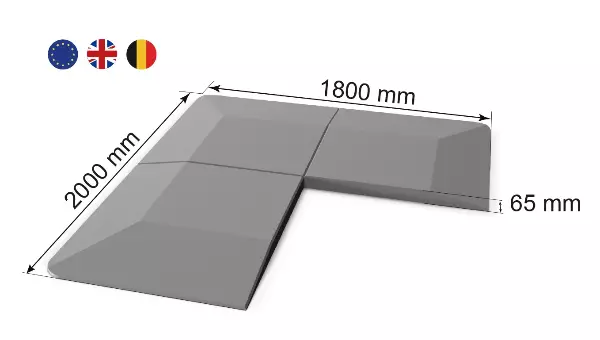
2 meters long speed cushion
This speed control tool consists of 4 equal parts (2 right corners and 2 left corners).
Its dimensions are:
- Length: 6.5 feet / 2000 mm
- Width: 6 feet / 1800 mm
- Height: 2.5 inches / 65 mm
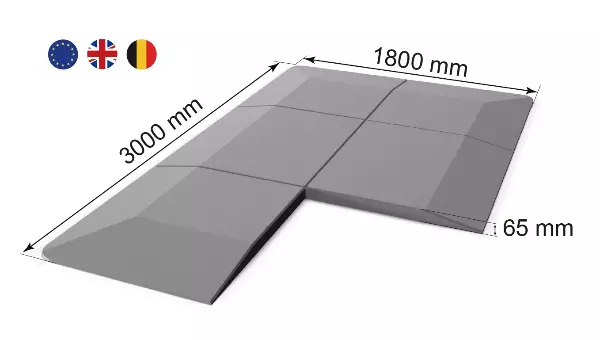
3 meters long speed cushion
It consists of 6 parts (2 right corners, 2 left corners, and 2 middle parts).
Its dimensions are:
- Length: 10 feet / 3000 mm
- Width: 6 feet / 1800 mm
- Height: 2.5 inches / 65 mm
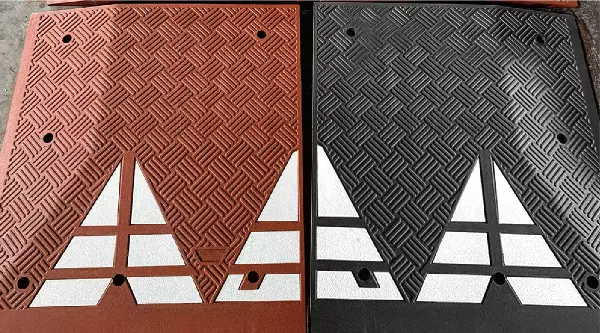
Red & white or black & white
Both forms of our speed cushions are available in red and white or black and white colors. Red and black are the base colors, while white triangular reflective films make them prominent at night.
We use 100% vulcanized rubber (90% recycled and 10% virgin rubber) that neither chips nor fades over time.
Why choose us
4 reasons for choosing Speed Cushions Factory!
— Looking for the right speed cushions manufacturer? Here are the reasons why you should go for the Speed Cushion Factory!
Factory Price
We have a team of qualified engineers and manufacturers who produce superior-quality speed cushions. Since we are speed cushion manufacturers, you can buy speed cushions directly from us at factory rates to save time and money.
Regulations
Our speed cushions can be used in different countries because their designs, styles, and sizes are according to the regulations and guidelines issued by municipalities of different countries.
Eco-friendly Materials
We use 90% recycled rubber to help conserve the environment.
Non-slipping surface
Our speed cushions have patterned surfaces and a 0.65 plus coefficient of friction.
9 facts about why our road speed cushions are important in traffic control
Our speed cushions can improve your road safety in multiple ways. The following facts show what makes them essential for roads:
- Slow-down speeding vehicles: Our speed cushions force speeding vehicles to reduce their acceleration from 15 to 20 miles per hour (mph). It helps increase vehicular and pedestrian safety in the area.
- Reduce the number of accidents: A speed table prevents vehicles from over-speeding, helping decrease the rate of accidents and fatalities.
- Motorists and cyclists can avoid them: A motorist, cyclist, or bicyclist can pass through the channel between speed cushions to avoid speed reduction.
- Allow emergency vehicles to pass without speed reduction: An ambulance or fire truck can easily drive over our speed cushions because we keep their width smaller than the width of emergency vehicles. It helps these vehicles maintain their emergency-response time.
- Regulate the traffic route: Drivers tend to avoid roads that have traffic calming measures like speed cushions, speed humps, etc. Install our speed tables on busy roads to make drivers change their routes and make roads less busy.
- Less traffic noise: Our speed cushions are made of rubber which is a flexible and soft material compared to recycled plastic, concrete, and asphalt. They comparatively produce less noise when vehicles drive over them.
- Less discomfort to drivers: The raised section of a speed cushion is extended. So when a driver passes over it, he experiences less discomfort than when he drives over other speed control tools like a speed breaker, speed hump, or speed bump.
- Don’t affect rainwater drainage: The longitudinal channel between speed cushions lets rainwater move on roadways. This way, water does not accumulate and drains easily.
- Can be installed in various places: You can install them on an unmarked crosswalk, slow zone, pedestrian zone, roundabout, cut-through, school zone, parabolic parking space, or any other similar area to improve your traffic control plan or transportation system.
How to buy our traffic speed cushions?
Are you interested in buying our speed cushions to make your city streets and road traffic lanes safe?
Get in touch with us to know the pricing or anything else that you need to know before purchasing our products. We will be more than happy to answer your queries and make your purchasing process easier!
How are our traffic-calming speed cushions packed?
Our speed cushions are manufactured in China and shipped worldwide. We pack our products in quality plywood cases to ensure our customers receive them in the best possible condition.
We pack two sets of speed cushions and their mounting hardware in a single plywood case.
Now, you might be thinking, why do we use plywood cases? Well, it’s because they offer many benefits, such as:
- They are easy to store, load, and unload
- They are lightweight
- They are durable and do not crack or split easily
- They are eco-friendly
Where to use our traffic speed cushions?
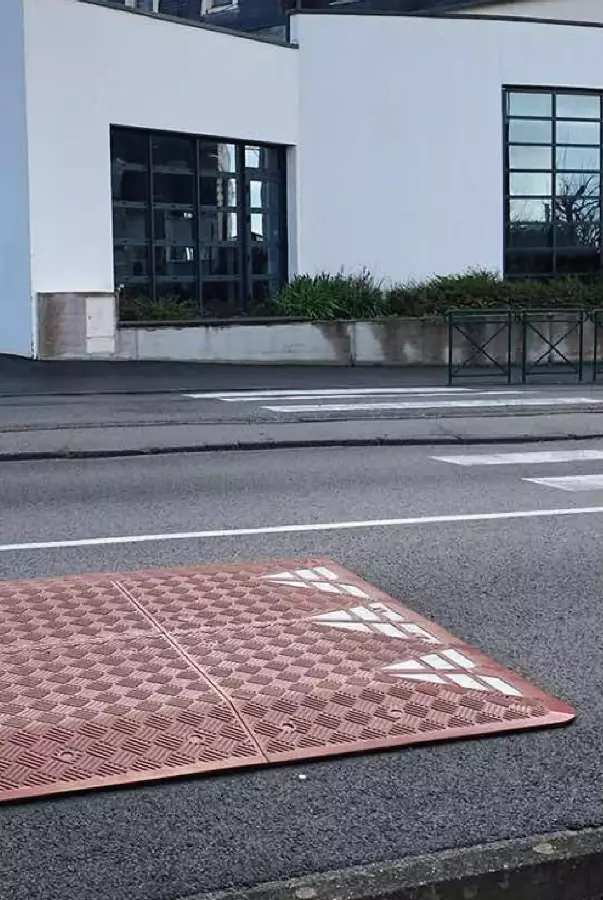
Our speed cushions are versatile and can be installed in various places to improve road-traffic safety and discourage accidents. Some examples of these places are:
- Uncontrolled intersection zone
- Pedestrian crossing
- Two-way road
- Interchange
- Work zone
- Low-speed zone
- School zones
- Traffic intersection
- Crosswalks
- Roundabouts
- Driveway
Our speed cushions are not painted; hence their color will not fade. You can install them in both low and high-traffic areas.
You can also use our speed cushions with other road traffic safety tools such as recycled plastic speed bumps, traffic cones, traffic signals, road markings, rumble strips, road signs, traffic barriers, bollards, traffic signs, or speed breakers to take the efficiency of your traffic safety programs to the next level!
How to install our traffic cushions?
Installing our speed cushions is simple, easy, and quick. We send free installation kits (consisting of galvanised hex flange coach screws and plastic anchors) with our products, so you just need standard installation tools like a drilling machine or hammer to install them.
Follow this step-by-step guide to install our speed cushions like professionals.
- Step 1: Mark the area with chalk where you want to install the speed table. Make sure the marking is parallel to the road’s edges and the area is clean.
- Step 2: Assemble and position all pieces of our speed cushion the right way.
- Step 3: Get a drilling machine and start drilling holes. The depth of holes should be according to the length of anchors and screws.
- Step 4: Clear holes with an air compressor to remove dust.
- Step 5: Insert adhesive and then anchor it into each hole with the help of a hand-held sledgehammer. Now, insert the hex flange coach screw assembly and secure it to its place with a drill.
Our speed cushions can be installed within a few minutes. You can install them yourself if you know how to use standard tools like a drilling machine or hammer.
We recommend you install warning signs, regulatory signs, or speed signs before them to warn drivers and pedestrians of their presence beforehand.
Are our materials friendly to the environment?
We use 90% recycled rubber, which makes our products eco-friendly. Additionally, our packing cases are also friendly to the environment. It makes our factory and products the right choice for companies and retailers who take environmental protection seriously.
Want to learn more features of our products that make them worth buying?
Here are some of their key features:
- They are surface mounted. So, there is no need to excavate the road and block traffic for hours.
- They are low maintenance as they don’t fade, crack, or chip.
- Their ultra-hard-wearing construction material makes them withstand years of use.
- They have uniform designs and shapes. They will not scrap a motor vehicle when it drives over them.
- You can install them on asphalt, concrete, or block paving to diversify their use and increase road safety.
- You can get your company’s logo molded into them to meet your aesthetic and marketing goals.
How do our speed lumps work?
The main goal of all the traffic safety tools like wheel stops, traffic control signs, pavement markings, road bumps, and stop signs is the same: to make roads safe for both pedestrians and drivers.
Each tool performs its role differently. Some are more effective than others. Compared to other tools, our speed lumps are more efficient in many ways.
They have a wider raised surface that lets vehicles drive over them smoothly after reducing their speed up to 20 mph. This helps reduce the number of crashes or collisions between vehicles in high-traffic volume areas.
Fire trucks, buses, and other long-axle vehicles can drive through the spacing left between speed cushions without reducing their speed. This way, they can reach their destination on time.
Transportation engineers and highway safety departments use them to enhance road safety for drivers, vehicles, and pedestrians.